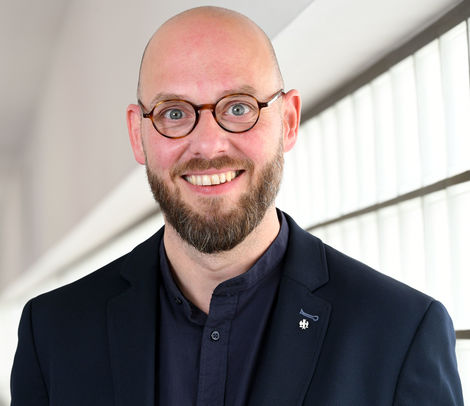World Youth Day becomes a platform to dialogue about connection between climate justice and colonial history; without reference to Jesus Christ
Why did few young people from Germany register for the World Youth Day in Portugal? Stefan Ottersbach from the BDKJ youth association blames Corona - but not only. An interview on the pressing issues of the youth meeting.
Bigger than any music festival: At the beginning of August, hundreds of thousands of Catholic youth from all over the world spend a week together in Portugal's capital Lisbon. What opportunities does a major event like World Youth Day offer? To talk openly and without fear about colonialism, for example, says Stefan Ottersbach of the Federation of German Catholic Youth (BDKJ) in an interview:
Question: Mr Ottersbach, what does an event like World Youth Day mean to Catholic young people in these times - in a time marked by climate crisis and war, and within the Church by abuse scandals and stirring reform processes?
Ottersbach: Many feel it is a great opportunity to take part in a festival where they can communicate with other young people and make friends. Especially in times of war, the international understanding that takes place at such an event should not be underestimated. In addition, young people can experience: I am part of a faith community that spans the world and to which many more people belong than I often experience at home.
Question: What has the BDKJ planned for the programme in Lisbon?
Ottersbach: At the so-called International Youth Hearing, a panel, we want to talk with young people about the connection between climate justice and colonial history. Since the 15th century, many countries have been colonised from Portugal - especially in Africa, but also in Asia and Latin America. At the Youth Hearing, we are particularly interested in the perspectives of people from the global South.
Question: Only recently there was a fuss about a "politically incorrect" Vatican stamp for WYD. It showed Pope Francis standing on the Monument of the Discoveries in Lisbon - in place of the Portuguese conqueror and navigator Henry, who is considered the founder of the Portuguese colonial empire. Is the WYD also an occasion to come to terms with the role of the Catholic Church in colonialism?
Ottersbach: From my point of view, it definitely has to be. We as the Catholic Church and also the Pope must take a stand on this. In March, there was a Vatican statement on the so-called Doctrine of Discovery [the supposed "discovery of America" by the Europeans, editor's note] - but it was only signed by two Vatican authorities. What has yet to happen is that Pope Francis will also comment on it personally. The WYD is a great opportunity for us as a Catholic Church to speak openly and without fear about colonialism.
Stefan Ottersbach has been Federal Praeses of the BDKJ since July 2020. Born in 1975, Ottersbach from Duisburg studied theology in Bochum, Münster and Lucerne and was ordained a priest in the diocese of Essen in 2002.
Question: This year, far fewer young people have registered than for previous World Youth Days. What do you attribute that to?
Ottersbach: After the pandemic, I think many people are still cautious about such big events. Many also say: we first want to go on a trip with our own group, to make our own group experiences strong again. Last but not least, I suspect that quite a few young people are unfamiliar with such a large church event.
Question: Because of the abuse scandals?
Ottersbach: Exactly. Among the young people I meet in my daily work, I notice that the feeling of alienation towards church power structures has become much greater. Not necessarily towards the faith, but towards the institution of the church and towards hierarchical structures.
Question: How is the issue of abuse being addressed at the WYD?
Ottersbach: Last week there were press reports that the Pope will meet with victims of abuse. We very much welcome this personal exchange and consider it indispensable, because the recognition of the suffering of the victims can only go hand in hand with an understanding of the dimension of abuse. I very much hope that Pope Francis will give a strong word on this. That he gives his word to young people to do everything to address in the future also the structures that have favoured abuse. The reappraisal and prevention of sexualised violence in the Church are not yet being promoted to the same extent everywhere in the world. I also hope that the bishops will use the WYD as an opportunity to address it.
Question: How do you want to prevent abuse from happening around the WYD as well?
Ottersbach: We train leaders and have developed comprehensive protection concepts so that young people know where they can find support.
Question: The motto of this year's WYD is "Mary arose and departed in haste" from the Gospel of Luke. Mary is not necessarily popular with many young people in this country - at least not in the classic interpretation of the self-sacrificing woman who puts her whole life at the service of others. How does that fit in with modern young people today?
Ottersbach: Thank God, there are many different images of Mary, including that of a young woman with whom many can identify: "She set out on her journey" is something that an incredible number of young people know. Setting out without knowing exactly where they are going. Mary as a representation of solidarity who knows about worries and uncertainties, but faces them with trust in God.
Cathcon: This interview is a shortened version of one already produced a month ago. That interview contained the outrageous claim that Our Lady is a Synodalist. When Our Lady is seen in visions, she appears to the poorest not to the time-serving elite of the Synodal process










.jpeg)

Comments